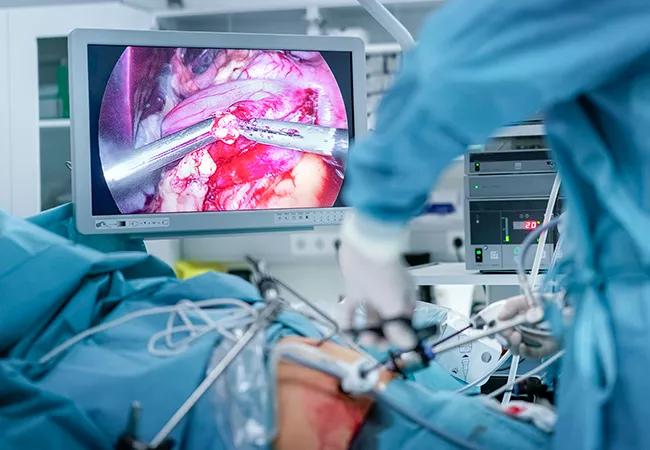A multicenter cohort study of patients with obesity suggests a decreased risk of developing new obesity-related cancers in patients with a history of bariatric surgery

A recent multicenter, population-based study showed that bariatric surgery significantly decreases the risk of de novo cancers among patients with obesity. These findings, which were presented during the Digestive Disease Week conference, underscore the importance of bariatric surgery to treat obesity and lessen the burden of cancer.
Advertisement
Cleveland Clinic is a non-profit academic medical center. Advertising on our site helps support our mission. We do not endorse non-Cleveland Clinic products or services. Policy
“The strong association between obesity and cancer is well-established,” notes study author Roberto Simons-Linares, MD, Director of Bariatric & Metabolic Endoscopy, Department of Gastroenterology, Hepatology & Nutrition, Cleveland Clinic. “However, our understanding of the impact of bariatric surgery on cancer risk has been limited to date.”
In this retrospective cohort study, Dr. Simons-Linares and colleagues sought to study if bariatric surgery has a protective effect against de novo cancers among patients with obesity. They used a multi-institutional database from 47 U.S. healthcare organizations that included more than 107 million patients.
ICD-10-CM coding was used to identify adults with a BMI greater than 35 and to determine a history of bariatric surgery such as sleeve gastrectomy, gastric bypass and gastric band procedures. Individuals with a history of prior malignancy, peptic ulcer disease or ascites were excluded from the analysis.
The International Agency for Research on Cancer was used to determine which cancers had sufficient evidence of an association with obesity, according to Dr. Simons-Linares. These included esophageal adenocarcinoma and multiple myeloma, as well as kidney, colon, rectum, stomach, liver, gallbladder, pancreas, ovary, endometrium, breast and thyroid cancers.
To minimize the impact of preexisting cancers, the research team initiated their assessment for de novo cancer diagnosis one year after the index date — time of bariatric surgery for the study group or obesity diagnosis for patients in the nonsurgical cohort.
Advertisement
The research team initially identified 60,285 patients in the bariatric surgery group and 1,570,440 in the nonsurgical control group. Of these patients, the median age was 43.2 and 46.4 years, respectively. Eighty percent of the bariatric surgery cohort and 63.6 percent of the control group were female. Both groups were predominantly Caucasian.
Following propensity score matching, 55,789 patients were included in each cohort. Data showed that the cumulative incidence of obesity-associated de novo cancers at 10 years was 4.0 percent (2,206 patients) in the bariatric surgery group versus 8.9 percent (4,960 patients) in the nonsurgical control group.
Additionally, Dr. Simons-Linares and colleagues reported that the bariatric surgery group had lower prevalence rates for de novo breast, colon, liver, pancreatic, ovarian and endometrial cancer when compared to their nonsurgical counterparts.
“Our study shows that individuals with a history of bariatric surgery did have a lower risk of developing new cancers,” says Dr. Simons-Linares. “These findings add to the growing evidence of the benefits of treating obesity and, more specifically, treating obesity with surgery but also with any other modality such as anti-obesity medications and endoscopic bariatric procedures.
“The take-home messages of this study are, number one, obesity increases the risk for cancer and treating obesity will help mitigate that risk,” he emphasizes. “Number two, bariatric surgery is lifesaving, and our data suggests that it does have a protective impact against the development of cancer.”
Advertisement
While this study is based on a large database of patients, Dr. Simons-Linares acknowledges that there are limitations to consider, including a lack of details on how much weight an individual lost and/or regained after surgery.
“We know the amount of weight loss will vary among individuals, and some will regain weight after surgery,” he notes. “However, we still observed positive effects from bariatric surgery, which make us think that there could be a weight-independent protective effect of bariatric surgery. Despite the amount of weight lost or re-gained following bariatric surgery, there is still a change in patient’s physiology and the long-term benefits remain for certain diseases; reducing cancer risk could be one of them.”
Moving forward, Dr. Simons-Linares and his team will continue their work, which will include more detailed studies to help overcome the limitations of their current analysis. “We hope to keep contributing to the literature of this very important topic.”
This research has implications for clinical practice as well as research, according to Dr. Simons-Linares. “Treating obesity helps prevent cancer — a disease with a significant societal and economic burden,” he says. “These findings show that we can potentially prevent the long-term, detrimental effects of cancer.
“Obesity treatment requires a personalized approach and healthcare providers need to support patients throughout their journey with nutrition, lifestyle modifications, behavioral support, as well as access to all available therapies to treat obesity such as anti-obesity medications and endoscopic bariatric procedures” Dr. Simons-Linares concludes. “This requires a multidisciplinary effort to ensure the best outcomes for our patients.”
Advertisement
Advertisement

Researchers explore how changes in the gut microbiome influence the brain's reward response to alcohol

Surgical intervention linked to increased lifespan and reduced complications

Retrospective study highlights psychosocial predictors of bariatric surgery outcomes

Comprehensive mental health screening may help prevent postsurgical risks

Consider each patient's unique disease progression and treatment goals when choosing a strategy

Sustained weight loss helps reduce IIH symptoms and medication dependence

Findings could help identify patients at risk for poor outcomes

Findings show greater reduction in CKD progression, kidney failure than GLP-1RAs